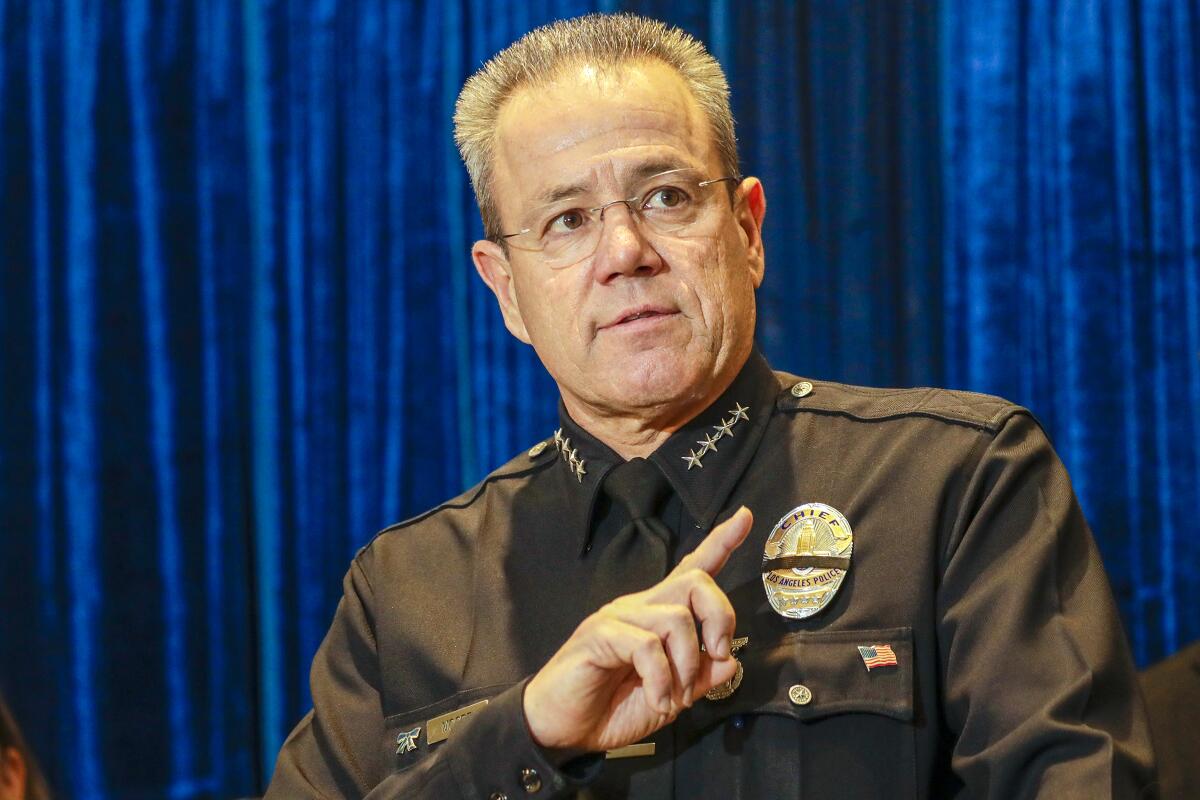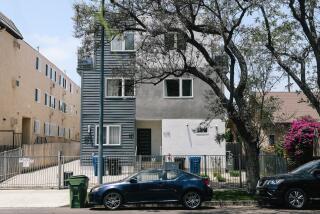Arrested 4 times in 3 weeks: L.A. police blame zero bail for rise in repeat offenders

Eric Medina has been arrested four times on suspicion of grand theft auto in the last three weeks.
It began with the theft of a Ford van April 9, authorities said. Within a day, he was back on the streets, helped by California’s statewide zero-bail policy for lesser offenders fueled by the coronavirus outbreak.
Five days later, officers apprehended him with a stolen Toyota truck, officials allege. Again he went to jail, only to be freed without bail. Police say he stole another Toyota truck on April 20. And then last weekend, Medina was arrested yet again in a stolen 2009 Ford Focus.
Los Angeles police say Medina, 31, is part of a larger problem related to sweeping changes in the judicial system amid the COVID-19 pandemic, which has shuttered many courts and prompted officials to reduce jail populations to slow the spread of the coronavirus.
As coronavirus spreads, California prisons plan to release 3,500 inmates early.
On March 27, Los Angeles County implemented a zero-bail requirement for most misdemeanors and low-level felonies.
In the first 30 days of the policy, the Los Angeles Police Department has arrested 213 individuals multiple times, with 23 being arrested three or more times. They account for about 5% of all of those booked on misdemeanors or felonies, records show.
LAPD Chief Michel Moore said while crime in Los Angeles is down in almost all categories since the pandemic began and L.A. implemented its stay-at-home order, career criminals are now exploiting the situation, getting arrested over and over with no real consequences.
“I think repeat offenders need to be off the streets,” Moore said, calling for a reexamination of zero bail for repeat offenders.
An examination of LAPD arrests shows that while arrests are down 37% in the last month, those arrested multiple times is up compared to the same time last year. Persons with multiple arrests now account for 5% of all arrests compared with 4% the same period in 2019. Multiple arrests now account for 10% of all arrests compared with 8% in 2019 for that time.
In early April, California’s Judicial Council, the body that sets policy for all the courts, opted to implement the emergency bail schedule statewide after Gov. Gavin Newsom declared the coronavirus emergency.
Zero bails for misdemeanor and low-level felonies has long been a goal of justice reform advocates who say the current cash bail system unfairly locks up those without means prior to trial or resolution of their case.
In announcing a series of widespread changes to the courts, including the temporary zero bails earlier this month, California Chief Justice Tani Cantil-Sakauye, chair of the state Judicial Council, said to say “there is no playbook is a gross understatement of the situation.”
The move came as the state also was releasing 3,500 inmates and closing entry to prisons for new inmates to allow for social distancing to slow the spread of the virus.
Dist. Atty. Jackie Lacey endorsed the move, noting L.A. County implemented it early.
“Zero bail has been an effective tool in reducing the jail population and minimizing the spread of the coronavirus,” Lacey said in a statement. “Unfortunately, a few defendants have taken advantage of this public health effort. We will ask the court to consider bail in any extraordinary circumstances.”
Former San Francisco Dist. Atty. George Gascón, who is challenging Lacey in a November runoff election, said the virus has accomplished what criminal justice advocates and research studies could not.
“The novel coronavirus has forced our system of justice to confront a not-so-novel question, one that largely defined the criminal justice reform movement even prior to the pandemic: Does keeping huge numbers of people in custody on small-time offenses pose a greater threat to us all than letting them out?” Gascón asked. “This virus does not care if you’re a prosecutor, victim or a defendant. Innocent or guilty, this virus can still kill you.”
But LAPD Asst. Police Chief Robert Arcos said zero bail has also had negative consequences: “We like to think at these tough times people won’t exploit the system, but the reality is far different.”
Examining Medina’s recent arrests, Arcos noticed the fourth arrest. “Oh geez, he was arrested again over the weekend,” he said.
Despite the overall crime drop, Arcos said one category is going the opposite direction — automobile thefts.
According to LAPD Capt. Paul Vernon, who oversees the department’s Compstat data operations, car thefts in the last month have shot up across Los Angeles by nearly a third.
Armando Llamas was arrested on suspicion of a car burglary on April 23 in South Los Angeles. He was released without bail within hours. Llamas was back behind bars that evening for allegedly stealing a car, only to be released again. Two days later, he was arrested again.
One man has been arrested six times on suspicion of a variety of crimes, including brandishing a weapon and trespassing in the North Hollywood area, records show.
Arcos said the department is working with prosecutors to seek a means to having repeat offenders held with some bail.
Statewide, in more conservative counties, prosecutors and sheriffs have publicly questioned the move to release some suspected offenders without bail.
Orange County Dist. Atty. Todd Spitzer said the council should have allowed pretrial services professionals to do a risk assessment on some zero-bail cases, because some of the defendants may have prior strikes. He said the approach does not allow any real scrutiny of defendants.
“This shortsighted order handcuffs law enforcement, fails to take into account criminal history, and completely ignores the rights of victims,” he said.
More to Read
Sign up for Essential California
The most important California stories and recommendations in your inbox every morning.
You may occasionally receive promotional content from the Los Angeles Times.











